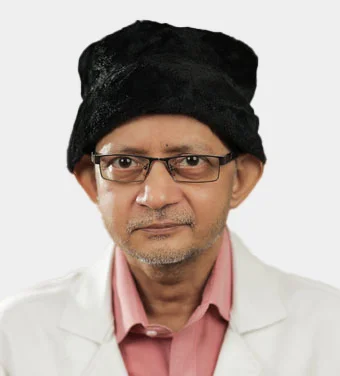
At IBS Hospital, we stand by individuals on their journey of recovery from ischemic stroke. Our integrated approach blends cutting-edge medical interventions with compassionate support. With personalized rehabilitation plans, innovative therapies, and unwavering encouragement, we help patients regain their strength, abilities, and confidence for a brighter future.
What is Ischemic Stroke?
An Ischemic stroke occurs when an artery supplying blood to the brain is blocked, typically by a clot. This condition is commonly observed in individuals above 60 years of age, particularly in those with arteries damaged by atherosclerosis, a condition characterized by plaque buildup. The diminished blood flow resulting from the blockage can lead to the death of brain cells, causing irreversible and permanent damage.
Recognising the Symptoms of Ischemic Stroke
- Sudden weakness in the face and limbs
- Partial or complete paralysis
- Confusion
- Slurred speech
- Dizziness and vertigo
- Loss of balance and coordination
- Loss of vision
- Speaking difficulties
- Memory loss
- Neck stiffness
What causes Ischemic Stroke
Ischemic stroke is primarily caused by blockages in major brain blood vessels, often linked with blood clots. Common conditions associated with blood clot formation include:
- Atherosclerosis
- Atrial fibrillation
- Heart attack
- Valvular defects
- Blocked carotid arteries
- Bleeding or clotting disorders
Diagnosis of Ischemic Stroke at IBS Hospital
Diagnostic methods for detecting ischemic Stroke include:
- Computerized Tomography (CT) scan
- Electrocardiogram (ECG)
- Magnetic Resonance Imaging (MRI)
- Electroencephalogram (EEG)
Management / Treatment of Ischemic Stroke at IBS Hospital
Several treatment options are available at IBS Hospital for patients with Ischemic Stroke:
- IV Medication: Clot-dissolving medications or thrombolytic drugs may be administered within 4.5 hours of symptom onset to dissolve the clot and restore blood flow.
- Endovascular Procedures: Direct administration of tissue plasminogen activator (TPA) to the affected brain area is a common procedure. For larger clots, clot removal with stent placement may be recommended.
- Carotid Endarterectomy: This surgical procedure involves removing plaque from the carotid artery to restore normal blood flow to the brain. It’s highly recommended for patients at risk of ischemic stroke.
Please remember that treatment options depend on individual circumstances and should be discussed with our medical professionals for tailored advice.
Our team of experts that make it possible
Meet the team of highly specialised and experienced neurosurgeons, neurologists, orthopedicians, and other experts in the field of neurology and spine care. Our team is dedicated to providing personalised and compassionate care to each patient, with the goal of helping them achieve the best possible outcomes.
IBS Hospital Empowers Your Treatment with Cutting-edge Technology
We continuously incorporate cutting-edge technologies from around the world into our offerings, such as a surgical system that allows for precise and confident complex procedures. We use magnetic stimulation to treat certain neurological conditions and create personalised brain maps for tailored treatment plans. Nerve monitoring during surgeries ensures the nervous system is not compromised, and a robotic exoskeleton aids in mobility issues. Our goal at IBS Hospital is to provide the best care possible, utilising the latest and most innovative technologies available.








